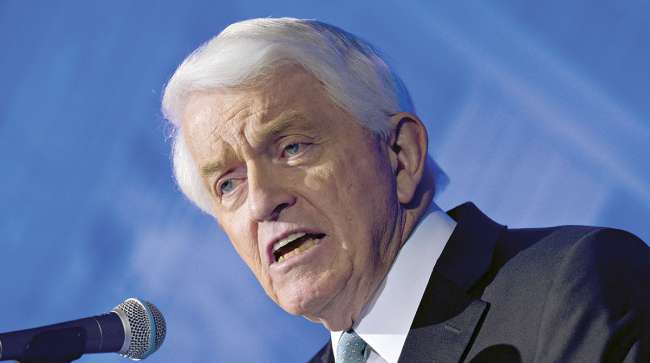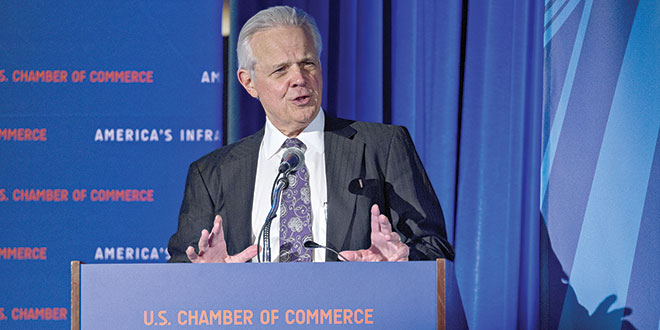Business, Labor Leaders Offer Support for Infrastructure Funding

WASHINGTON — The chorus of support for funding highways and infrastructure grew louder last week with the U.S. Chamber of Commerce unveiling a four-point plan that would raise fuel taxes, expedite the permitting process, facilitate more private investment and help construction firms address a shortage of skilled labor.
“It’s time to invest in 21st-century infrastructure to grow the 21st-century economy,” President Tom Donohue said at a Chamber of Commerce-sponsored infrastructure summit Jan. 18.
The meeting included representatives from trucking and construction industries, shippers, and state and local transportation agencies, all of whom said it was imperative to find the means to rebuild and modernize America’s infrastructure.
A4 @scorementors: @uschamber Tom Donohue described a plan that = more than 500,000 construction jobs a year. YUGE #rebuildnowchat
— American Trucking (@TRUCKINGdotORG) January 18, 2018
Donohue proposed raising the federal tax on gasoline and diesel — either by 5 cents a gallon per year over five years, or 25 cents a gallon all at once — is the “simplest and fairest” way to raise more money to pay for road repairs. The increase would generate $394 billion over 10 years and cost the average driver about $9 a month.
FedEx Freight President Mike Ducker voiced support for the chamber’s initiative and said Congress also should consider a proposal put forth by American Trucking Associations that would assess a 20 cents-per-gallon fee on a broad range of transportation fuels at the wholesale level, generating $340 billion over 10 years for the Highway Trust Fund.
Congestion adds $65 billion to the cost of freight transportation, Ducker noted, and it limits the ability of the United States to compete in the global market.
“Roads are not a one-time investment,” he said. “They require maintenance and updating. …The time is now to build America’s infrastructure. Let’s get ’er done,” he said, invoking a phrase made popular by Larry the Cable Guy.

Ducker by Andrew Harrer/Bloomberg News
The federal tax on fuel has not changed since 1993, although 39 states have raised fuel taxes since then, in part, to make up for shortfalls in federal funding.
“The gas tax is a start, but it’s not a panacea,” Donohue said. “Infrastructure is more than roads, and we need to leverage public and private resources to provide financing over a long period of time.”
Donohue said the chamber would support expanding the use of federal loan programs and private activity bonds to pay for projects.
Rich Funk, associate director of product supply, purchases, global e-commerce logistics, strategy and sustainability at Procter & Gamble, said his company spends $1 billion annually on transportation in the United States and has $300 million tied up in inventory in transit.

With better infrastructure, truck and rail carriers could run more efficiently, Funk said, and he figures that his company could reduce the average transit time from three days to two, saving the equivalent of $100 million in cash flow.
Projected over the entire U.S. economy, that could result in a trillion-dollar boost to Gross Domestic Product, Funk said.
Vulcan Materials CEO Tom Hill said there is evidence that shows the public supports increased spending for infrastructure projects. He cited 75% of state ballot initiatives on infrastructure in the past two years passed. “Voters want this,” he said.
And voting for an increase in fuel taxes isn’t likely to hurt the political fortunes of lawmakers, according to Jim Stephenson, CEO of Yancey Bros. Co., a Caterpillar equipment dealer in Georgia and vice chairman of the U.S. Chamber of Commerce board of directors.
Georgia passed a gas tax increase in 2015, and not one legislator who supported the measure was defeated in subsequent elections. “It’s not just good business, it’s good politics,” Stephenson said.

Schroer
John Schroer, a commissioner in the Tennessee Department of Transportation and president of the American Association of State Highway Transportation Officials, said states need more leeway to approve infrastructure projects, and he praised President Donald Trump for intervening to expedite permitting processes for several projects in his state.
Several speakers raised concern about the potential loss of workers if immigration issues aren’t resolved.
“We need some kind of legal status for workers,” said Stephen Sandherr, CEO of Associated General Contractors of America. “They are not bad guys. They show up for work every day to provide for their families.”
Terry O’Sullivan, general president of the Laborers’ International Union of North America, said some workers are “already starting to go underground” since the Trump administration announced an end to a program granting temporary protected status to refugees from El Salvador.



